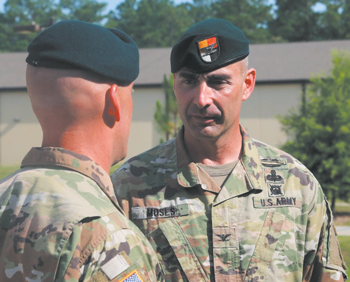 The U.S. Senate has temporarily blocked the promotion of an Army colonel who formerly commanded Fort Bragg’s 3rd Special Forces Group, The New York Times reported. Col. Bradley Moses was in line for promotion to brigadier general. He was the commanding officer in charge when an ambush claimed the lives of four U.S. soldiers outside of Tongo Tongo, Niger on Oct. 4, 2017.
The U.S. Senate has temporarily blocked the promotion of an Army colonel who formerly commanded Fort Bragg’s 3rd Special Forces Group, The New York Times reported. Col. Bradley Moses was in line for promotion to brigadier general. He was the commanding officer in charge when an ambush claimed the lives of four U.S. soldiers outside of Tongo Tongo, Niger on Oct. 4, 2017.
He did not receive any punishment and is eventually expected to receive his promotion. But for now, Senate members are delaying the matter.
Investigations following the Niger ambush were criticized for placing much of the blame on lower-ranking officers. Family members of the fallen soldiers criticized the Pentagon’s handling of the investigation. The leader of the ambushed Operational Detachment Alpha, also known as an A-Team, was Capt. Michael Perozeni. He took much of the blame until it was revealed that he asked to not continue the mission before the attack, according to a redacted investigation. The probe revealed the ambush highlighted problems with the U.S. mission in West Africa, including poor medical evacuation capabilities and a lack of air support for troops on the ground.
Moses’ No. 2, Lt. Col. David Painter, told the A-team to continue the mission, a decision Moses also approved, according to The Times. Painter was subsequently punished following the ambush and not promoted to full colonel. Moses was not punished.
Maj. Alan Van Saun, an Operational Detachment Alpha team commander who was home on paternity leave at the time of the ambush, received a formal reprimand when the investigation was concluded, effectively ending his Army career. Investigators determined he failed to prepare his soldiers for the deployment.
“Following a complicated tragedy with no clear proximate cause, First Special Forces Command issued reprimands with inaccuracies and inconsistencies, focusing on pre-deployment training and personnel issues, instead of operational decisions made leading up to the ambush,” Van Saun wrote. “Senior leaders within Africa Command ... presented their findings to the families of the fallen based on circumstantial evidence, which left them with more questions than answers.
“Africa Command held a press briefing, that, for the most part, admonished one of my Green Beret teams for their premission planning and preparation but barely mentioned the decisions made above their level,” he added.
Family members of those killed and even some green berets with the Third Special Forces Group expressed anger at the numerous investigations, spread out over almost two years, and lack of reprimands for high-ranking military officials, including Colonel Moses, for ordering the 11-member Special Forces ODA on the mission without knowing the enemy’s strength. Islamic State fighters had been tracking the team and were preparing to attack. Five Nigeriens accompanying the Americans were also killed in the hourslong gun battle. The four Americans killed — Sgt. 1st Class Jeremiah W. Johnson, Staff Sgt. Bryan C. Black, Staff Sgt. Dustin Wright and Sgt. La David T. Johnson — all received posthumous valor awards.
Special Operations ranking officer scrutinized
- Details
- Written by Jeff Thompson